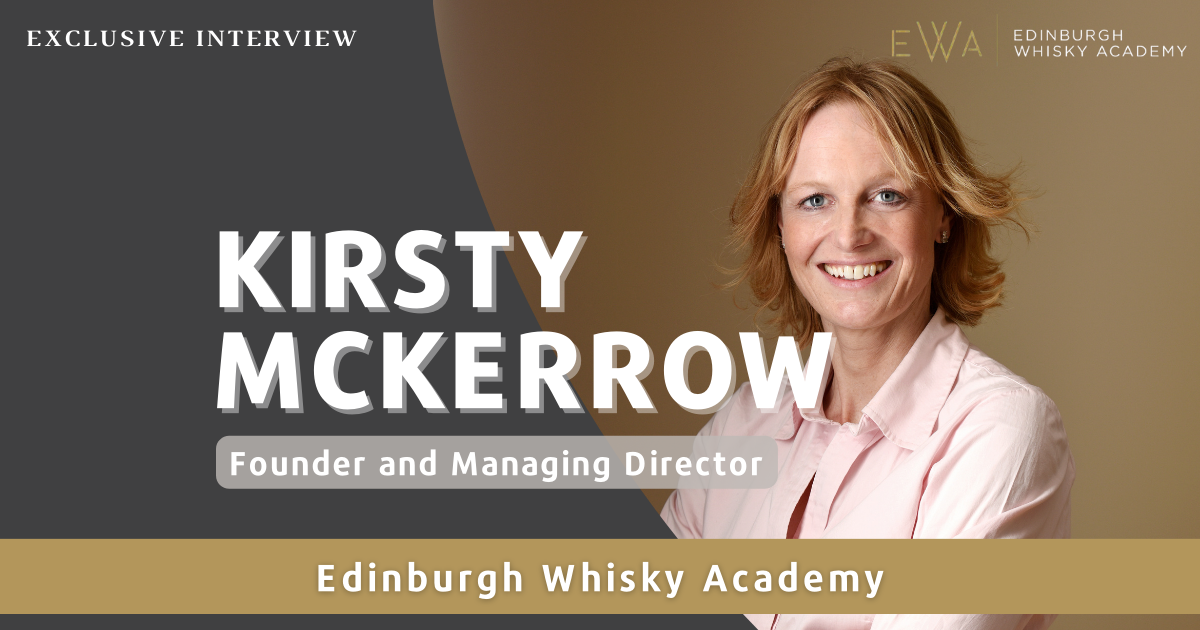
【Exclusive Interview】Kirsty McKerrow – Edinburgh Whisky Academy
- 繋ぎ手
- ウイスキーLOVER

Tony McGeever, the manager of the Soho Whisky Club, shared his unique career paths and stories, and his astonishing devotion to the whisky and its community. From the perspective of an enthusiastic whisky ambassador with 22 years of experience, Tony unfolded many tremendous back stories highlighting the firm connection that whisky communities have to complement and enhance the industry.
For this interview with the manager of the Soho Whisky Club, Tony Mcgeever, we have decided to compose two-part articles. Part 1 focuses on Soho Whisky Club’s history and philosophy, and Part 2 highlights Tony and his 22 years of experience within the whisky industry.
Dear WHISKY:
Please give us an introduction of yourself and a brief overview of your career.
Tony:
My name is Tony McGeever, and I am a Manager here at the Soho Whisky Club. In terms of career path, many people in the whisky industry will have what we call a linear progression, whereas I have a zigzag and a little bit of everything. I have been in a whisky ambassador role for 22 years, starting at 18 as a bar manager in Edinburgh. Back then, 22 years ago, whisky was not like this. Only six whiskies were on the back bar at the pub I was in. If we go back to that same bar in Edinburgh today, there would be over 40 different bottles of whiskies.
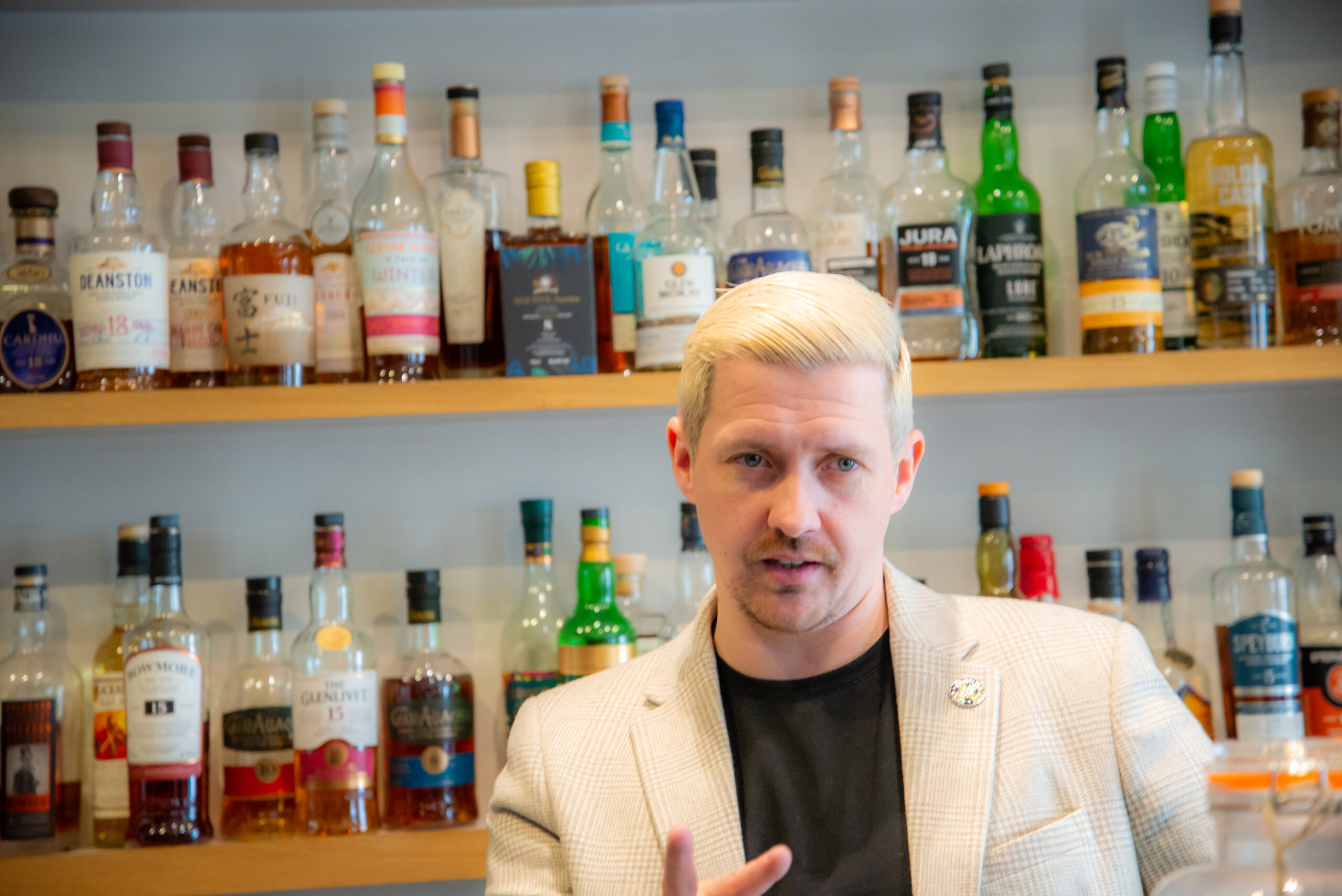
Tony McGeever
Dear WHISKY:
How did you get interested in whisky?
Tony:
It is an exciting story. I had an American tourist come into the pub in Edinburgh, and he asked for a peaty, smoky whisky, and I said to him, “We don’t do cocktails.”. I didn’t know what a peaty, smoky whisky was. I didn’t know because my age group did not drink Scottish whisky, even though I’m Scottish. It was Jack Daniels and Coke; that’s what we had, and even to this day, Jack Daniels is still the number one bestselling whisky in the UK. I am not saying it is bad; we also have Jack Daniels on here. However, at that moment, because I’m very proud of my Scottish heritage, I thought I should know about whisky.
Dear WHISKY:
Why is whisky that important for Scottish people?
Tony:
Whisky has been an ambassador for Scotland itself. It has traveled the world and put Scotland on the map. Everyone knows Scotland, undoubtedly because of the whisky or Sean Connery. So, at that moment, that American tourist from earlier sat down with me after my shift and bought me an Ardbeg. And he said to me, “You don’t drink the whisky that I have bought you, and you’ll wake up the next day, and the life would be the same. But, if you drink this, you will go on an adventure, and your life will change forever.”.
Dear WHISKY:
That is such an unique experience! Did you drink that whisky?
Tony:
Of course, I took a sip and immediately thought I needed to know everything. From there, I bought a book about whisky and brought it to the pub’s collection. I just wanted to do more storytelling about different towns in Scotland.
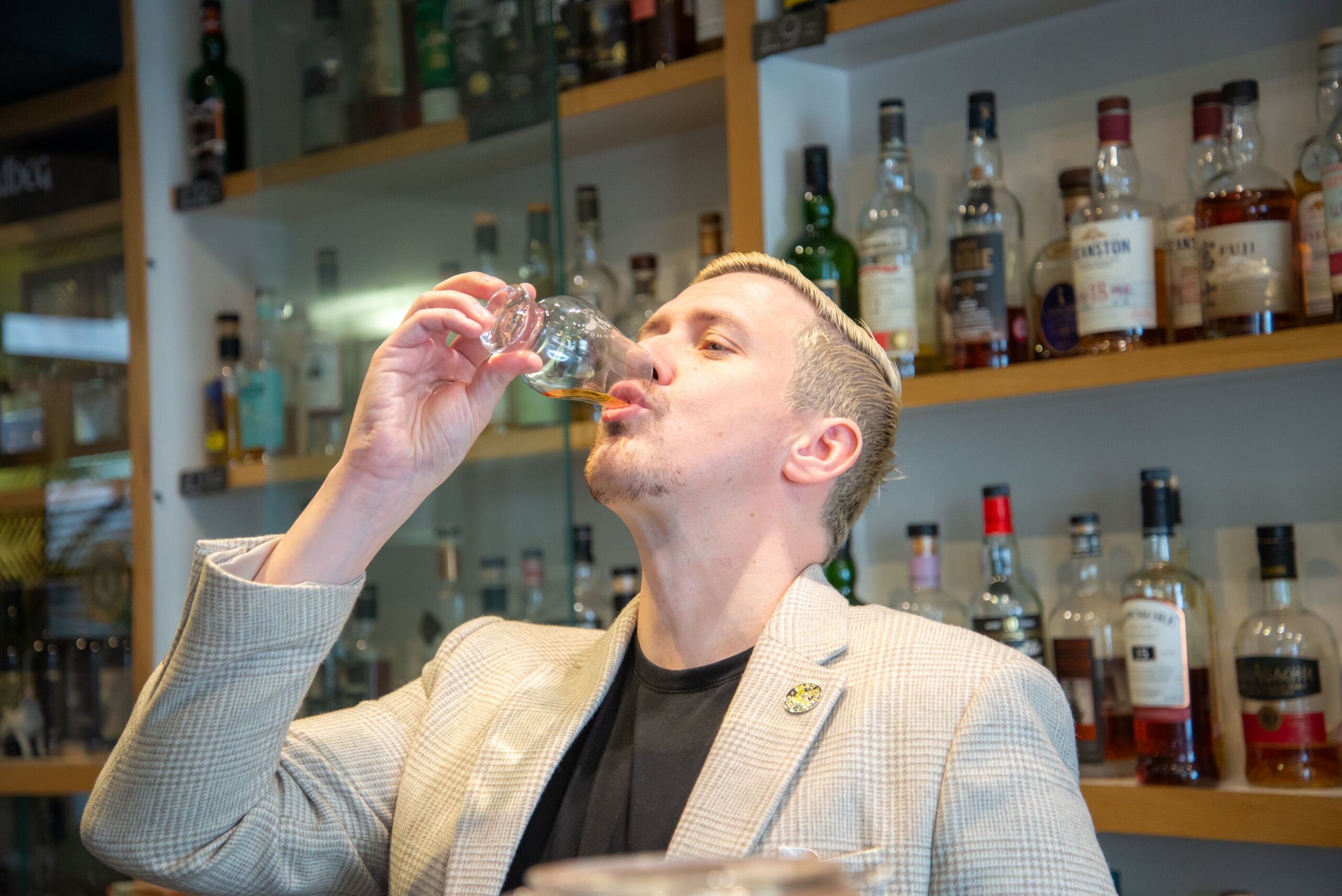
Tony drinking a dram of whisky.
Dear WHISKY:
What about whisky intrigued you so much?
Tony:
The great thing about whisky is it also showcases the people who make it. The community that makes the whisky is so essential, and I love that. That’s the reason why I got hooked. Then I worked at different whisky bars, and I only specialized once I came down to London, where I was in a West End show called Warhorse in the West End. Fortunately, I was the only Scottish actor on the West end then. So, people sent me whisky bottles to drink and posted those photos on Instagram.
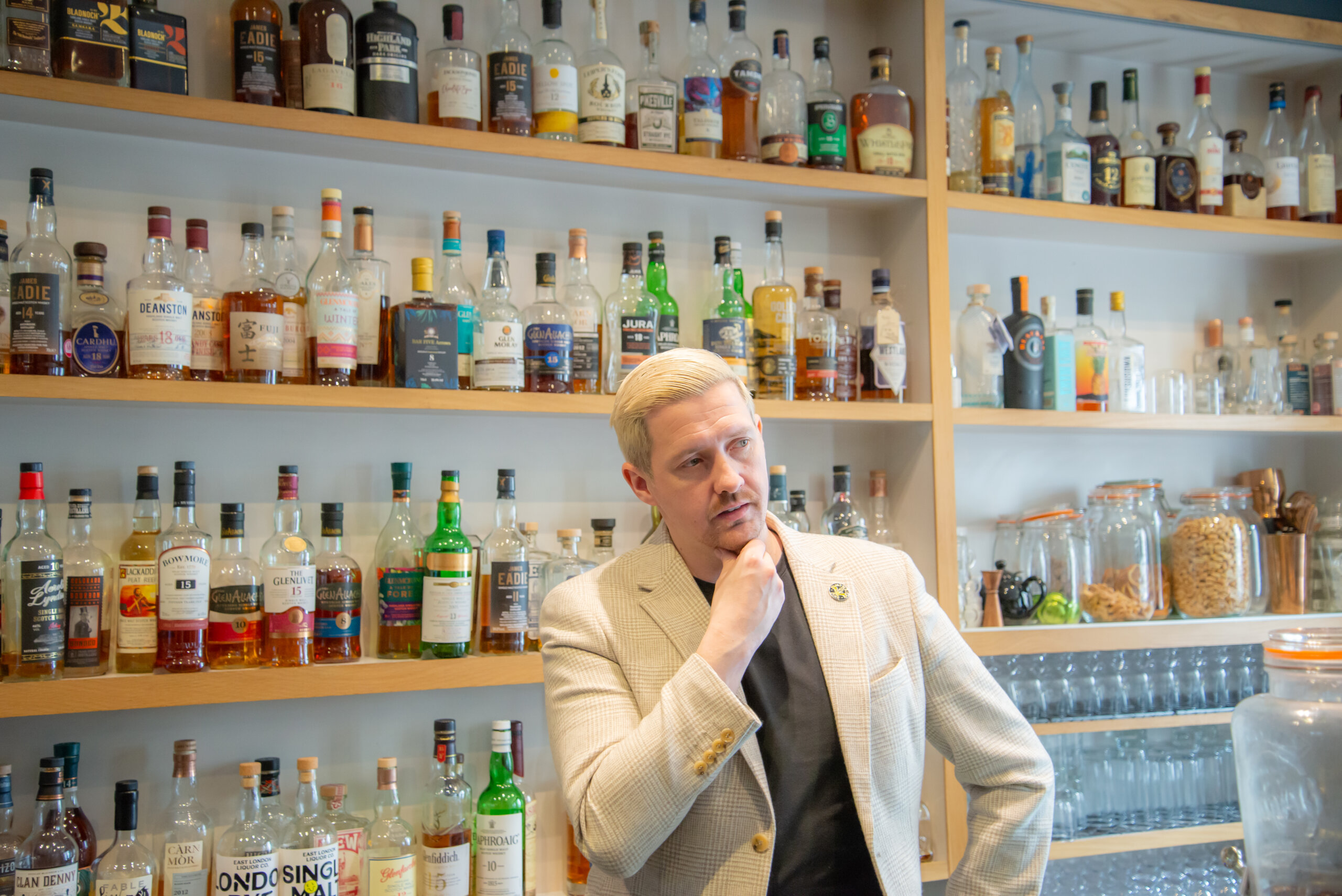
Tony explaining his career paths.
Dear WHISKY:
You were like an Instagram influencer then.
Tony:
This was before influencers were a big thing, so I started growing. Someone told me about the Soho whisky Club at a certain point, and I came here and realized, “Great, this is me.”. Therefore, after my career at the Warhorse, I wanted to get back into the whisky world. I was very good at storytelling because, being an actor, I’m an expert at staying confident and talking to a larger group of people.
Dear WHISKY:
How do you connect with so many people within the whisky industry?
Tony:
I have been doing this for 22 years, and I have worked for various brands in the past. By doing so, you would notice how small the Scottish whisky industry is. Although we are individual brands, we are one big family at the end of the day, and we help each other out. Everyone will be at the whisky shows and events; everyone gets to know everyone like a big family. Therefore, the whisky industry has outstanding engagement and connections.
Dear WHISKY:
Where exactly do you meet people?
Tony:
The Soho Whisky Club was a massive place for me. Since the people who walk through the door are legends in this industry, people like Dr. Bill Lumsden from Glenmorangie and Ardbeg or Colin Dunn, a top ambassador of Diageo. I get to draw from their experience and get educated from the masters themselves. I am their apprentice, even though I have been doing this for 22 years. It’s like Star Wars; they are like the Obi-Wan Kenobi or the Master Yoda, and they train me. That’s the great thing about whisky.
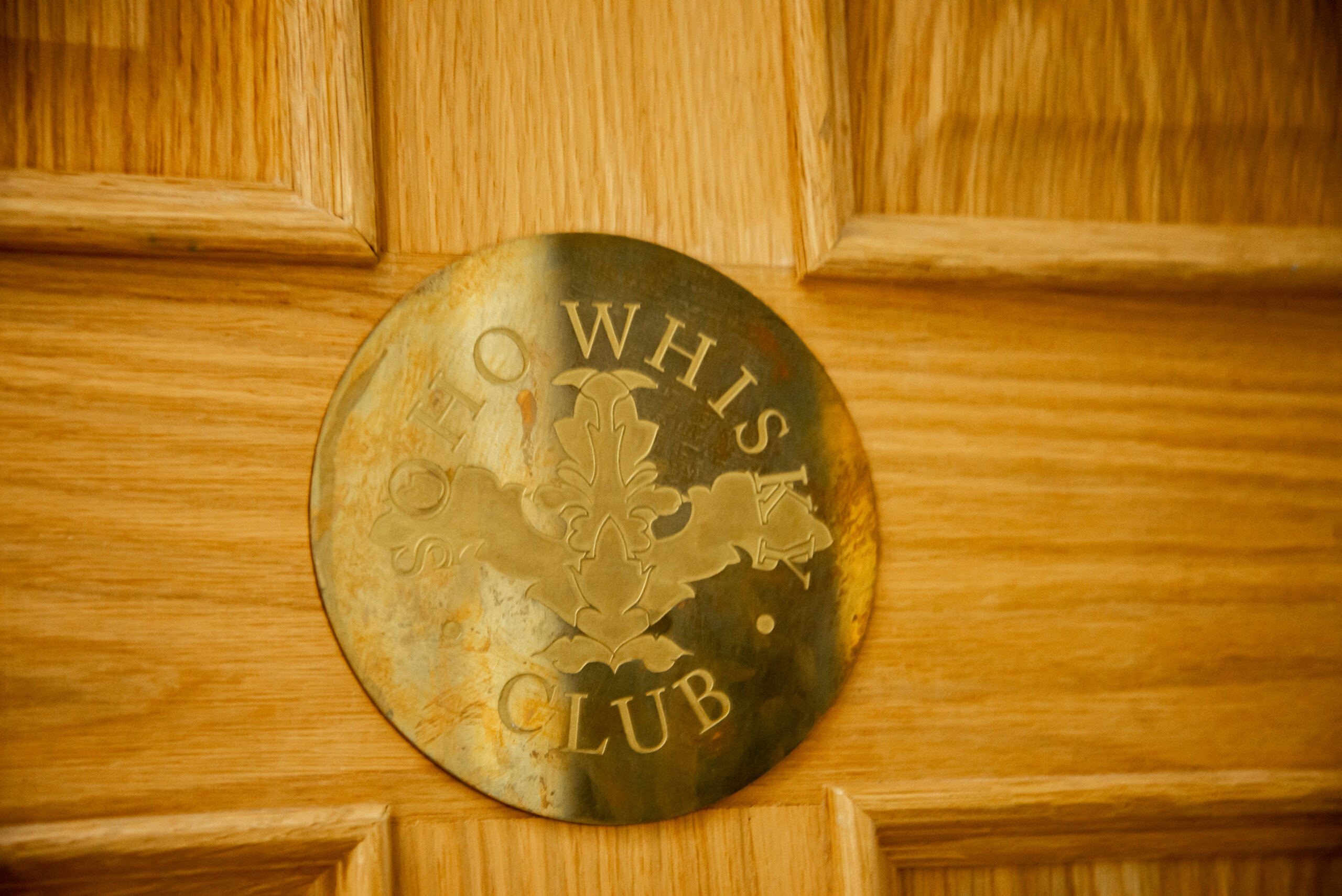
Soho Whisky Club emblem.
Dear WHISKY:
Do you see those firm connections often within the whisky communities?
Tony:
There is a whisky from Laphroaig called Lore, made by John Campbell, the ex-distillery manager. The word Lore in Gaelic means passing knowledge from one person to the next; ultimately, that’s what whisky is. I get taught and educated, and I pass it on to others, but then, as a whisky club, we also pass it on to the consumer, and they will tell someone. It is all about the Lore of knowledge, storytelling, and education.
Dear WHISKY:
How exactly did you get the position as an ambassador?
Tony:
Considering my skill set and experiences, the industry thought I would be fantastic as an ambassador for a whisky. Many major brands like the Glenfiddich and the Balvenie started hiring me to be their ambassador in London to represent and talk about their brands. Shortly after, I returned to Scotland and got some distilling experience to see how whisky was made at my friends’ parents’ distillery. From there, I returned to London and did more brand ambassador work until COVID-19 hit; then, I became a full-time consultant.
Dear WHISKY:
What was your life like after COVID?
Tony:
Starting in the middle of the COVID era, I became a consultant for whisky tastings conducted online. Around that time, many people asked me to help them with their new bars opening up or their new whisky businesses. For instance, I helped open the Spey Bar in Covent Garden, and then Malcolm and George, the ex-manager, asked me if I would come back to manage the Soho Whisky Club. I, of course, said, “It would be an honor” because it is such a special place in my 22 years of experience; I’ve never seen a bar or a community like such in the world. Like so, a little bit of a zigzag career while doing acting at the same time.
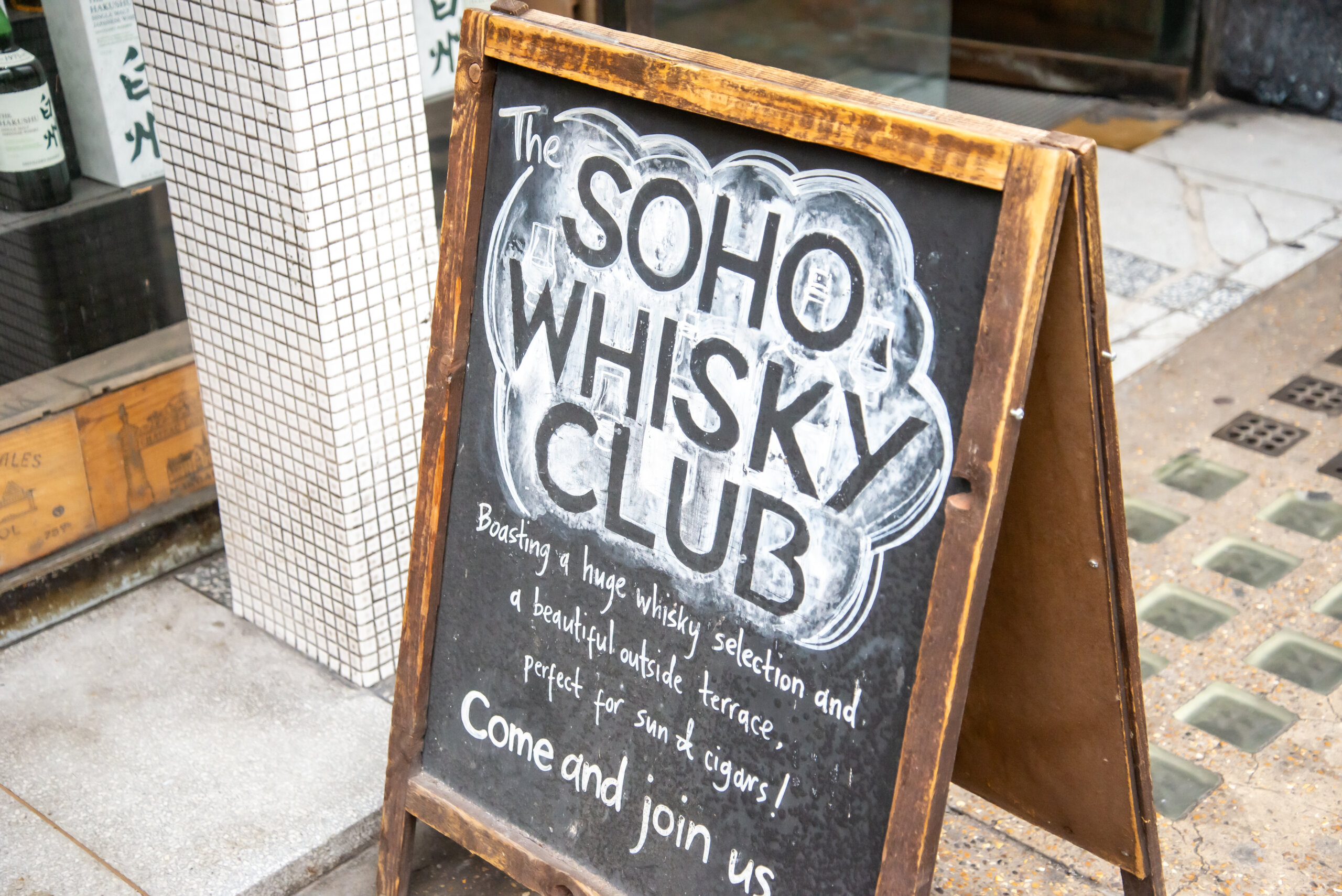
Sign outside on the street.
Dear WHISKY:
How does the consulting work?
Tony:
It depends on the problem, and I will always be honest and straightforward about whether I can genuinely help and push the project forward. I will tell my clients that I won’t be able to help them if it is not my expertise. However, I will find someone who can help them instead of myself.
Dear WHISKY:
What kind of company have you helped in the past?
Tony:
I once helped a distillery called Abington Distillery with their yeast fermentation regarding whether they should go with stainless steel or wood. Obviously, I had to convince them to go for the woods, so little things like that. Although I am no head distiller, by experience, what I was taught from other distillers, or ultimately, I could just go and ask them for advice if needed. This connection is what makes the whisky industry great. As I said, it is a family, so if you have any issues, I can always share my knowledge or gather more from others. It’s all about helping people.
Dear WHISKY:
What other skills do you have expertise in?
Tony:
I design logos, and I advise on bottle designs as well. Again, that’s just through experience; I have seen what has worked and what has not. It’s executed upon the perfect blend to use my skills to be an ambassador for whisky.
Dear WHISKY:
Do you still do acting?
Tony:
I’ve just finished Rings of Power, the Lord of the Rings TV show. On top of that, I’m about to do another West End show; hence, I’ve got blonde hair. Nowadays, people are laughing at me, saying, “Oh, Tony, you are like Ryan Raynolds.”, because he also got his own Gin.
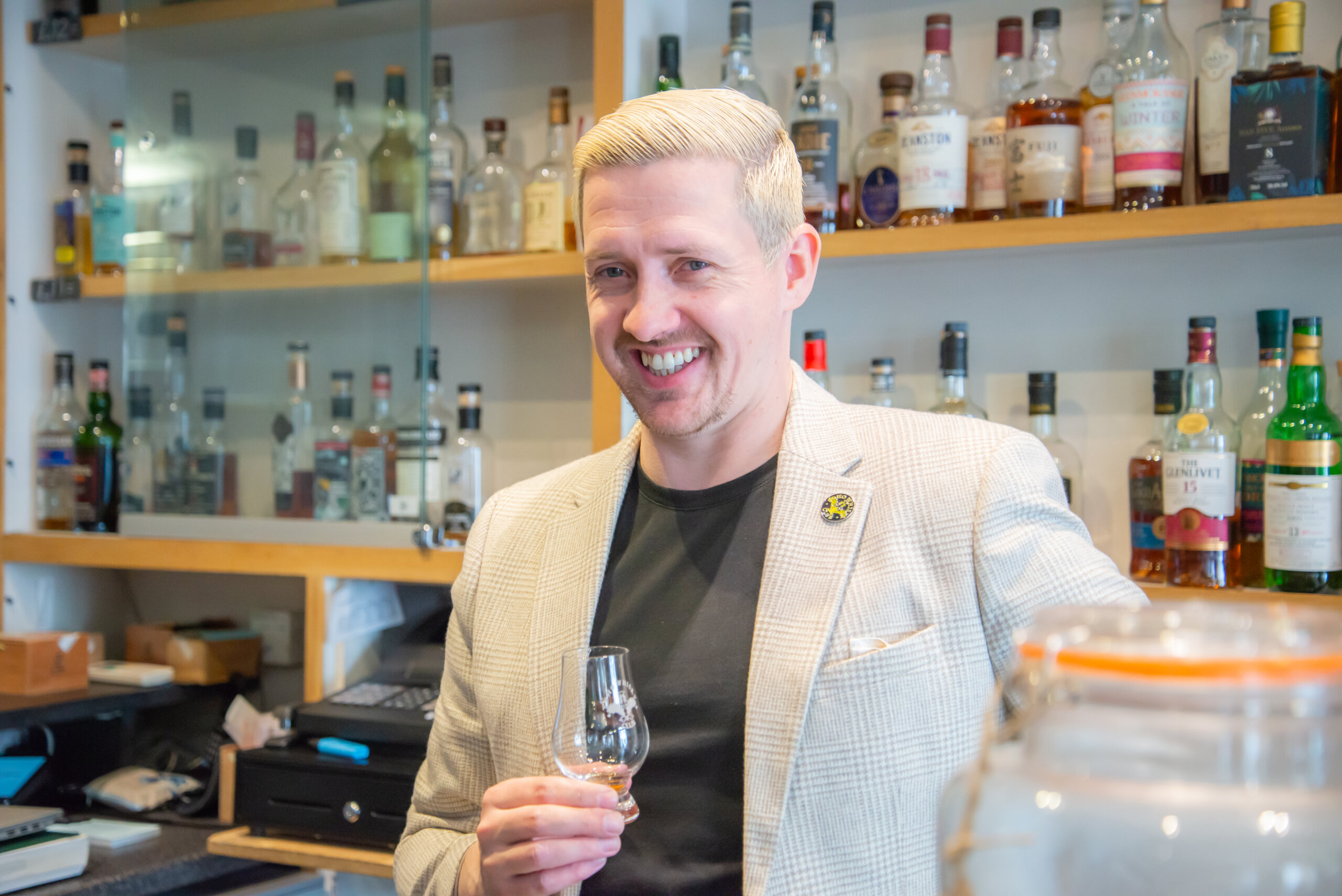
Tony talking about his acting career.
Dear WHISKY:
What made you start working at the Catton Casks?
Tony:
There is a vast amount of people who think that the cask investment is terrible. And I also was absolutely against it initially because some other companies were performing the whisky lock. This is where people buy an expensive whisky cask, store it, and wait till it hyper-inflates to the point no one would even consider bottling and never drink it. On the other hand, these people from Catton Cask came to me and first said that they wanted to do this the right way, the ethical way.
Dear WHISKY:
How is this “right way” different from some unethical ways?
Tony:
I ensure that we protect the communities in Scotland and that the casks are bottled and consumed. I can spread the proper way by being present there and showing how it should be done to other whisky investment companies. I can be an independent bottler to ensure whisky is consumed and flows smoothly within the communities. Don’t get me wrong, some fantastic companies and whisky brokers are doing it correctly, but unfortunately, like any trade, there are a few cowboys hurting the industry.
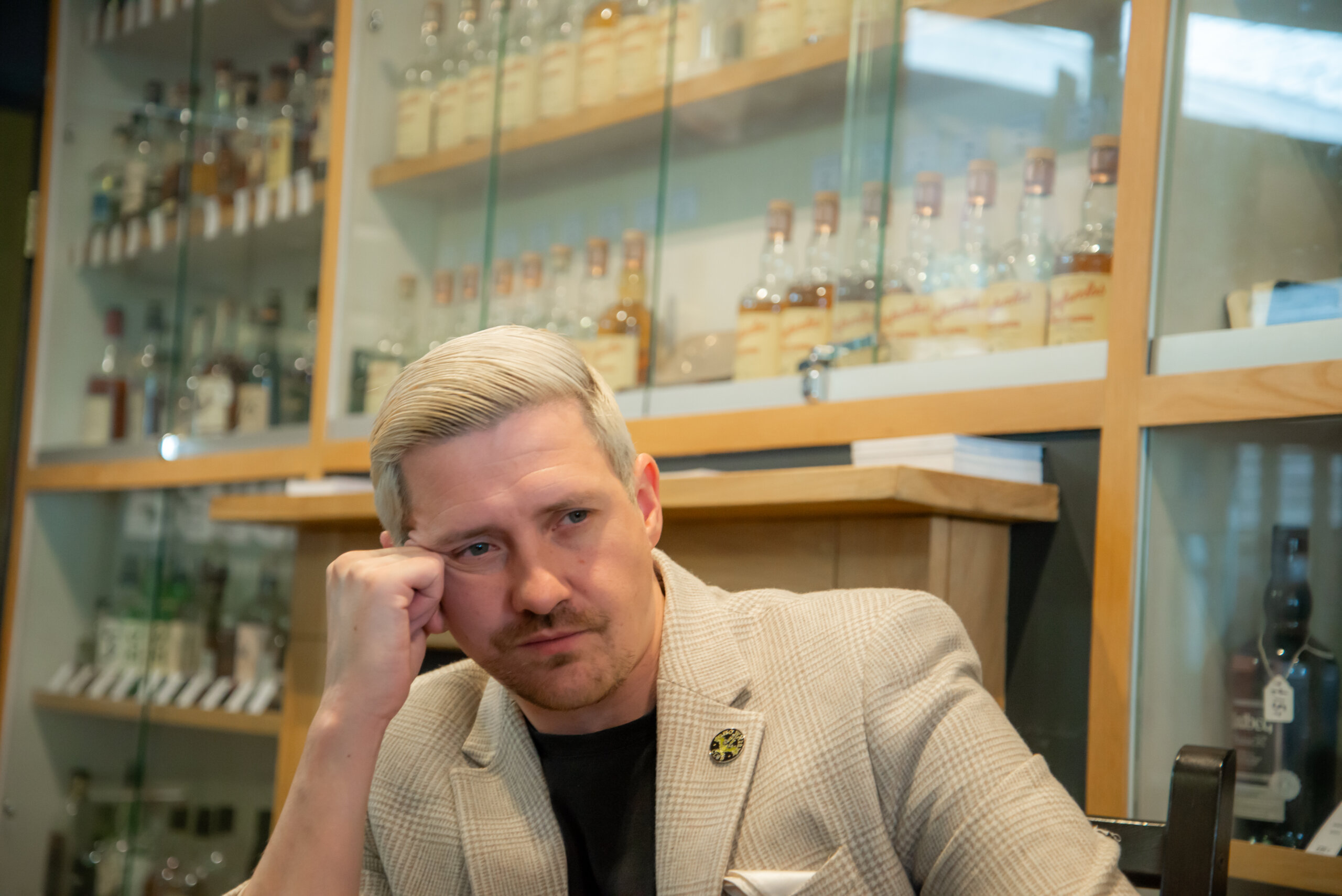
Tony, Chief Whisky Analyst at Catton Cask.
Dear WHISKY:
From the perspective of a person with various skill sets and positions, are there any issues the Scotch whisky industry faces right now?
Tony:
Currently, a massive glass shortage is going on, an enormous problem. Most Scotch whisky glass bottles come from China and are not produced in the UK. Hence, there’s a huge backlog due to all the recent social complications. Furthermore, with carbon neutrality and environmental sustainability, we’re changing bottle designs to accommodate that now.
Dear WHISKY:
Why is glass shortage so significant of an issue?
Tony:
The whisky bottle has been as integral and famous as the whisky itself. If you lined up bottles from around the world without a label or liquid in it, you would most likely be able to say, “Oh, that’s a whisky bottle,” compared to any other bottled spirits. It is such an iconic shape, the traditional Scottish bottle especially. Unfortunately, due to environmental constraints and glass shortage, we need to start looking at different materials other than glass. While doing so, we also need to find out if that will affect the flavor of the whisky. Bruichladdich has just launched its brand new, environmentally friendlier bottle, which many people hesitate to do. The great thing about whisky, and it’s funny, is that many people don’t like change; they want tradition.
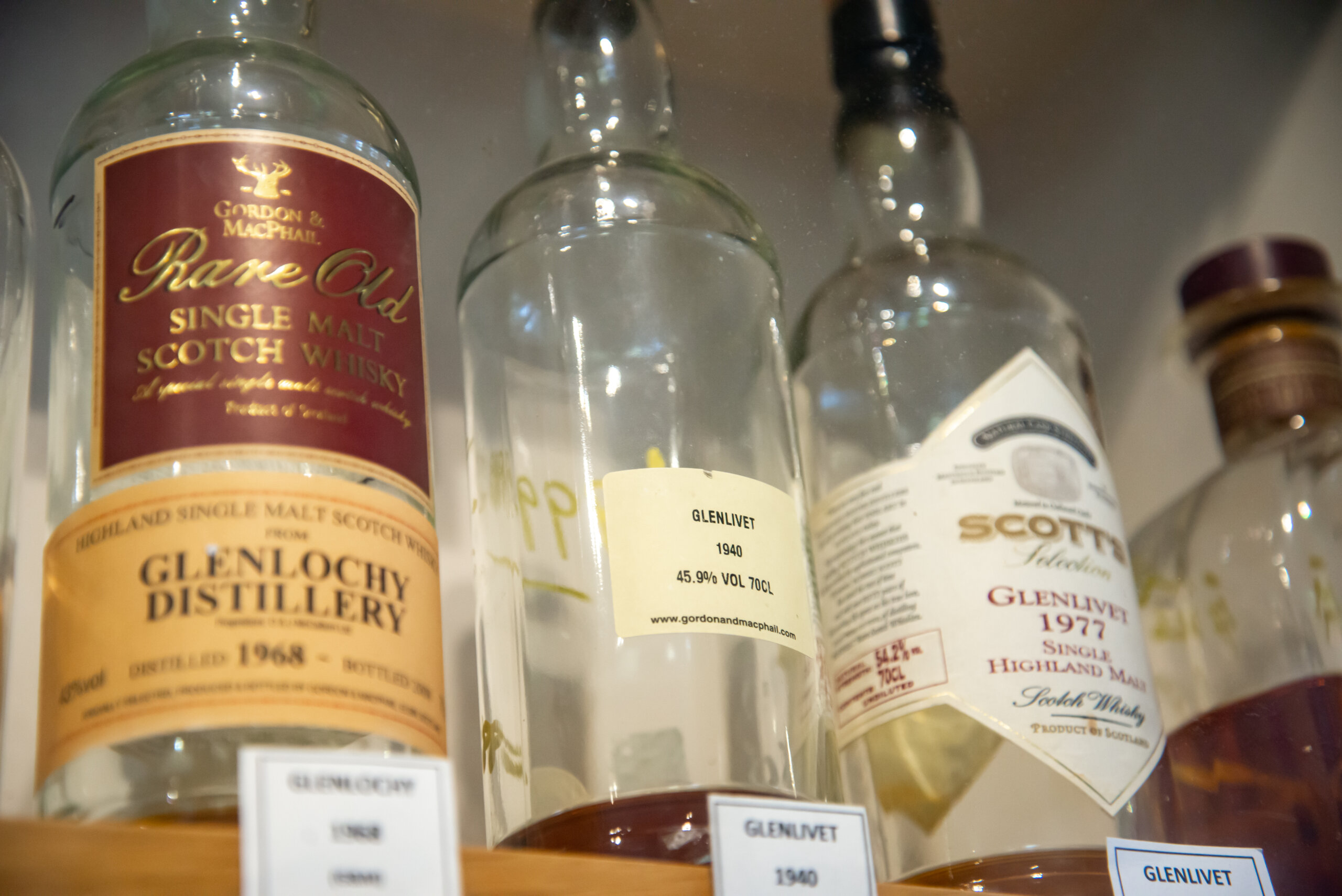
Glenlivet bottle from the 1940. Has the classic Scotch bottle shape.
Dear WHISKY:
Has the whisky industry always been stubborn and conservative?
Tony:
It was the same 30 years ago when many blends went out due to the popularity of single molts, and people were annoyed that their favorite blend was no longer available. This will always be the case. You will always upset people when going against tradition and trying to make a change, but you’ve got to look at the future. You’ve got to keep looking at the future for whisky and the future drinkers. And this is what I was saying: when you have someone who’s 18, who just got legally allowed to drink, you have to make their first experience phenomenal and right. If the first experience goes wrong, they’ll be put off for life and never go near whisky again.
Dear WHISKY:
Does that mean the industry has not and will never change?
Tony:
If you look at the history of whisky and the industry, it has always been about evolution and moving it forward. We always have to do that and be aware of the necessary changes. It is absolutely good to have the traditions, but we have got to push it forward for the industry to survive and last. And it’s the same with anything from the liquid to the bottle. If the bottle designs are becoming more modern, that’s good. There’s enough whisky out there. I always say there’s a whisky for everyone, and that can be from the liquid itself to the bottle design and the label.
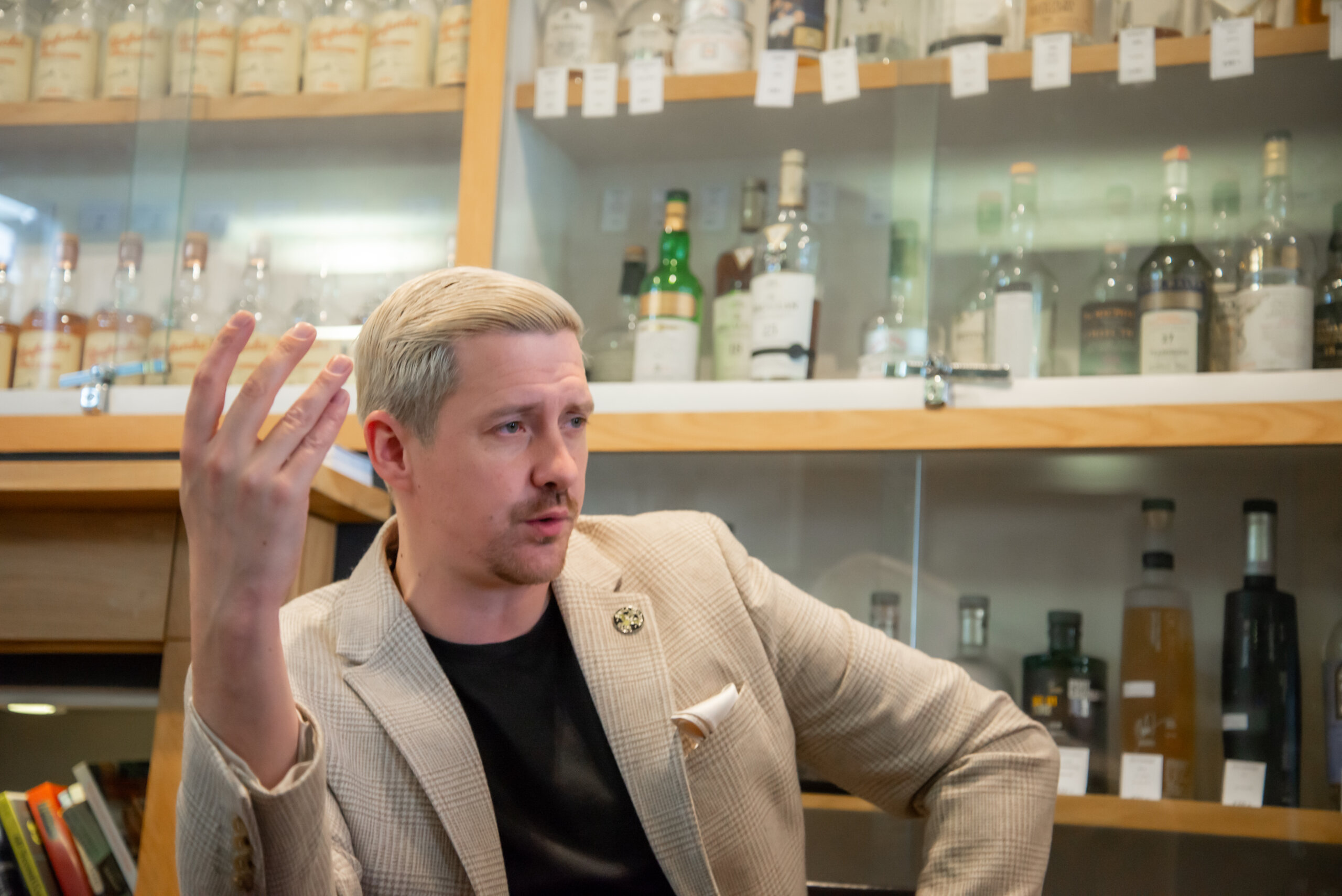
Tony commenting on whisky industry’s future.
Dear WHISKY:
What would you wish for the Scotch whisky industry to implement?
Tony:
The industry needs a fairground and occasion to discuss all the issues and strategies.For any discussion, whether it is glass recycling or cask investments, we need the right people at the table and a variety of people from all walks of life to make fair discussions and decisions.
Dear WHISKY:
Why do you think this industry needs a better discussion base?
Tony:
Regarding Carbon emission issues, Macallan was the first to tackle it among all the other whisky brands. As I mentioned, this industry hates changes, so it needs someone like Macallan to take the first step. However, only some distilleries could take that step, considering how expensive the whole process of re-building the distillery would be. Small to mid-range distilleries with insufficient income could only do it if the Scottish government and the Scotch Whisky Association supported them properly. A similar fiasco happened for the whole glass recycling program, as more prominent companies were okay with it, but for the smaller pubs, it was far too expensive to set those up. Hence, the whole thing had to be rethought. Discussion should represents and include everybody’s standpoint.
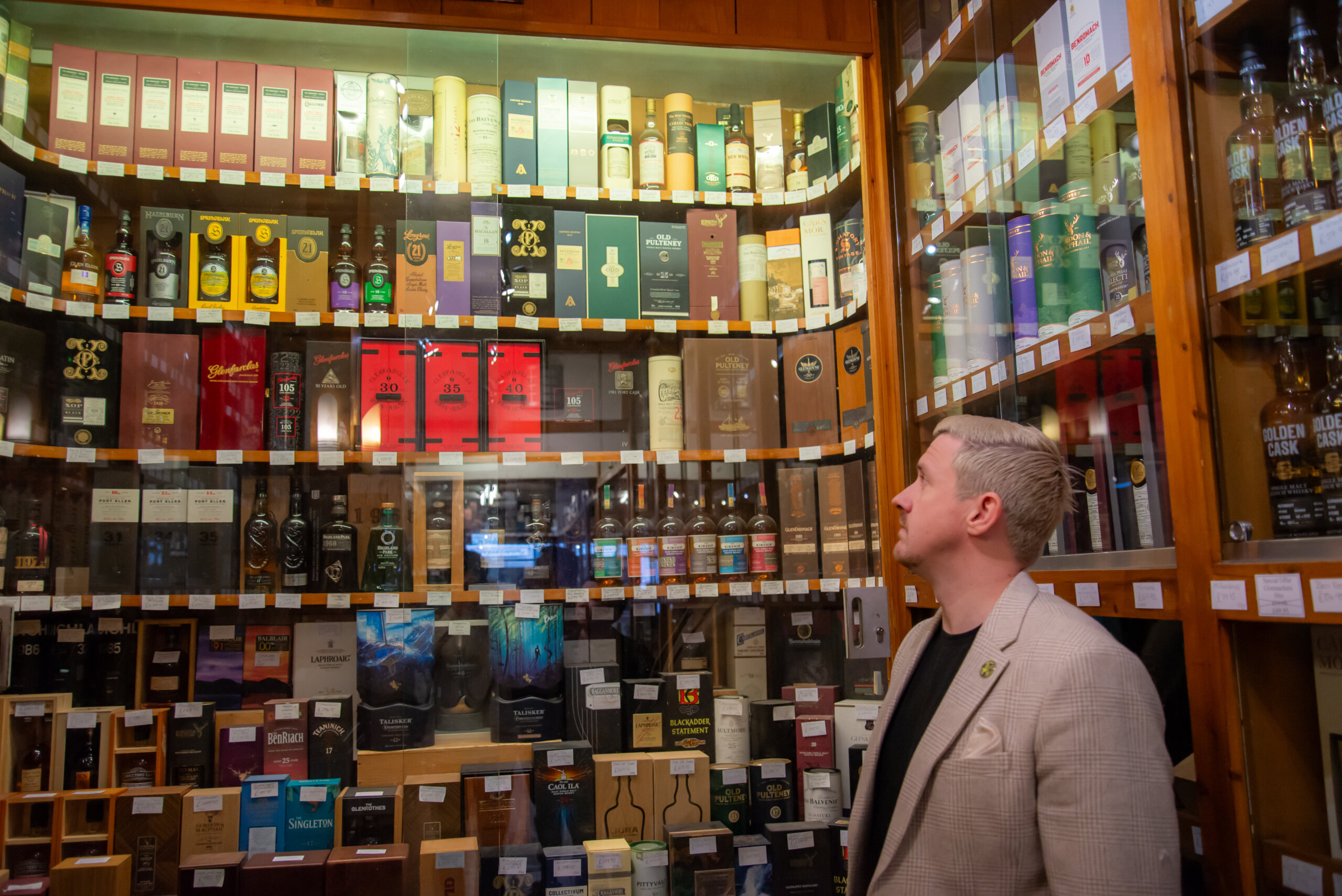
Tony inside the Vintage House Whisky shop below the Soho Whisky Club.
Soho Whisky Club’s philosophy and Tony’s hospitality truly embody what they believe whisky is for: shared and enjoyed through connecting people as a universal language. Tony quotes, “Whisky can be shared by all, and loved by all,” revealing his faith in whisky and its industry to survive and evolve. Soho Whisky Club is not only the lounge where people come and relax but also a place where one can learn or educate others to connect and spread devotion to the whisky industry.
Don’t forget to check out Tony’s blog on the Soho Whisky Club website, and visit the Soho Whisky Club for private tastings. That would not require a membership and would be an excellent starting point for your whisky club journey!